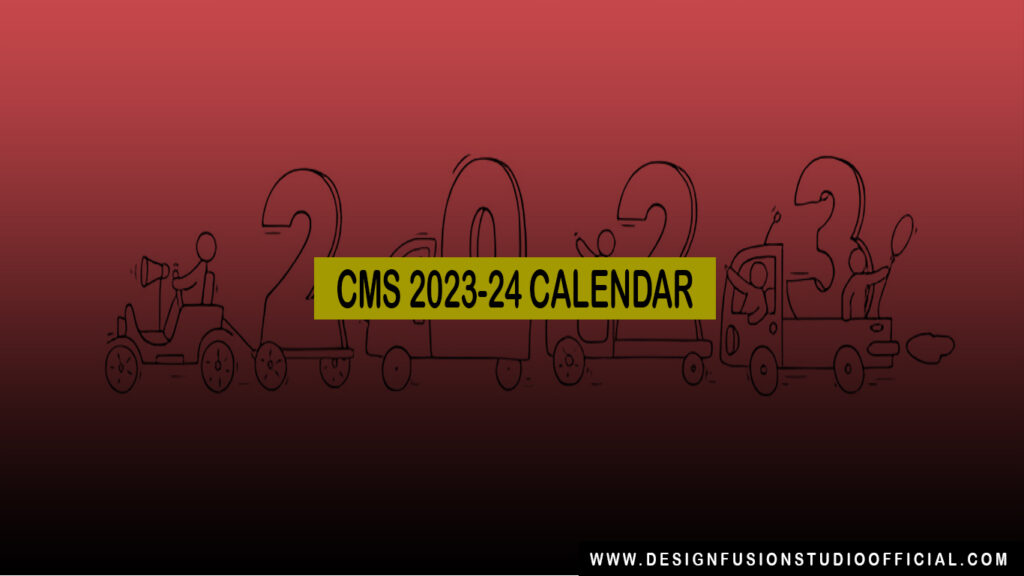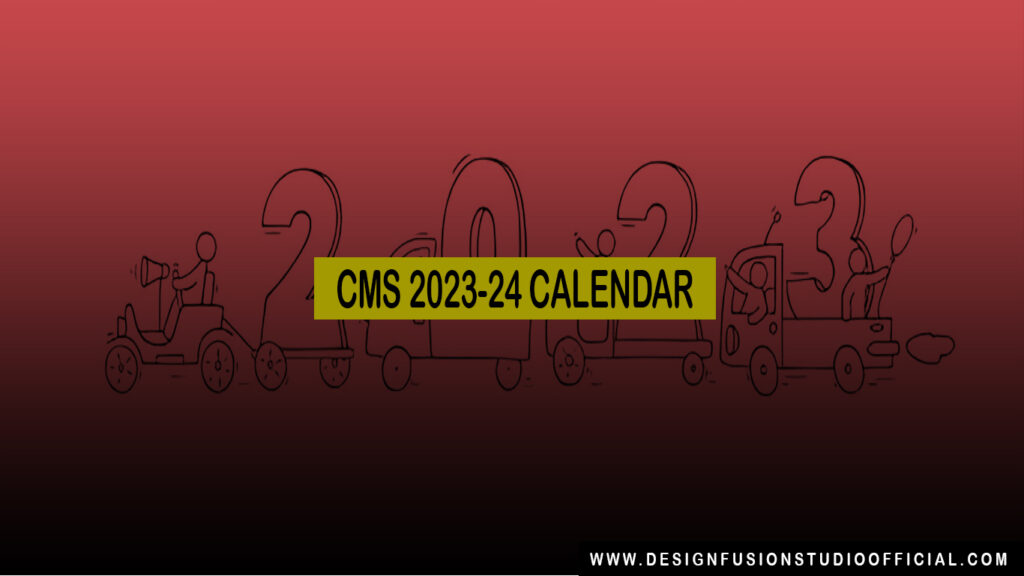Table of Contents
Introduction: Why the CMS 2023-24 Calendar Matters
Hello and welcome! If you’re a healthcare company, administrator, or all of us involved within the healthcare enterprise, you know how vital it is to stay up to date with the CMS (Centers for Medicare & Medicaid Services) calendar. The CMS 2023-24 calendar is your roadmap for the year, packed with key dates, cut-off dates, policy updates, and extra. This weblog will take you thru the whole lot you need to realize to navigate this calendar effectively and confidence. Ready to dive in? Let’s get started!

Understanding the CMS Calendar
So, what exactly is the CMS calendar? Simply put, it’s a detailed time table released by using the Centers for Medicare & Medicaid Services that outlines critical dates, closing dates, and updates for the healthcare industry. This calendar is important for healthcare companies and directors to ensure they stay compliant with guidelines and make the most of to be had possibilities.
The CMS 2023-24 calendar is established to provide a clear timeline of events, from policy updates to reporting time limits. Understanding the way to examine and interpret this calendar is step one toward leveraging it efficaciously. Think of it as your healthcare playbook for the year!
Key Dates and Deadlines: Don’t Miss Out
Keeping music of key dates and cut-off dates is critical for staying compliant and maximizing possibilities. The CMS 2023-24 calendar is filled with important dates that you in reality can’t manage to pay for to overlook. From open enrollment durations to reporting cut-off dates, every date performs a big function to your healthcare journey.
For instance, the open enrollment period for Medicare and Medicaid is a critical time for each company and beneficiaries. Missing this window can bring about misplaced possibilities and benefits. We’ll delve into extra information about those important durations later within the blog. For now, recollect that keeping a close eye on those dates can prevent a whole lot of hassle down the road. The numerous resources to be had that will help you navigate the 12 months successfully. Leveraging those sources can make a tremendous distinction in how you manipulate your exercise and live compliant with rules.
Training and Education Opportunities: Keep Learning
Continuous education is key to staying up to date and compliant. The CMS 2023-24 calendar consists of numerous education and training opportunities that will let you and your personnel live informed approximately the trendy updates and satisfactory practices.
Participating in these training classes not handiest enhances your know-how however also ensures your practice is aligned with the state-of-the-art CMS tips. Make the maximum of those possibilities to constantly enhance and stay in advance.
Impact on Healthcare Technology: Embrace the Change
Technology plays a essential role in modern-day healthcare, and the CMS 2023-24 calendar reflects this with numerous updates associated with healthcare era. Understanding those changes let you combine new technology into your exercise efficiently.
This year, there are updates on digital fitness records (EHR), telehealth structures, and other technological improvements. Embracing these modifications can improve your exercise’s efficiency, enhance patient care, and make certain compliance with CMS regulations.
Patient Education and Communication: Keeping Patients Informed
Effective affected person education and communication are critical additives of nice care. The CMS 2023-24 calendar emphasizes the importance of maintaining sufferers knowledgeable about their fitness and the changes in healthcare rules.
Developing clean and powerful verbal exchange strategies can assist your sufferers understand their alternatives, make informed choices, and adhere to remedy plans. Use the assets and tips provided through CMS to beautify your patient verbal exchange efforts.
Preparing for Audits and Inspections: Be Ready
Audits and inspections are part of the healthcare landscape, and the CMS 2023-24 calendar outlines numerous key dates and requirements for those processes. Being prepared for audits and inspections is vital to make sure compliance and avoid ability penalties.
Regularly reviewing your practices, preserving particular information, and staying up to date with CMS guidelines will let you be audit-ready at all times. This proactive method will save you time and stress when an audit is at the horizon.
Addressing Common Compliance Pitfalls: Avoiding Mistakes
Even the most diligent healthcare vendors can face compliance challenges. The CMS 2023-24 calendar identifies commonplace compliance pitfalls and offers techniques to avoid them.
Understanding these not unusual problems and proactively addressing them let you maintain compliance and provide brilliant care. Regular schooling and updates to your group of workers also are critical to make sure all and sundry is aware about the cutting-edge suggestions.
Innovations and Initiatives: Embrace the Future
The CMS 2023-24 calendar introduces several new innovations and tasks aimed toward improving healthcare delivery and patient results. Staying informed approximately those tasks will let you integrate them into your practice and beautify your carrier nice.
From new fee models to great development packages, those tasks provide possibilities to innovate and excel. Embracing these adjustments can position your exercise as a frontrunner inside the healthcare enterprise.
Future Outlook and Trends: Preparing for Tomorrow
Understanding the destiny developments and outlook in healthcare is critical for long-term success. The CMS 2023-24 calendar provides insights into emerging tendencies and future updates that you want to be aware about.
Staying ahead of those tendencies will let you put together for future modifications and ensure your practice remains competitive and compliant. Regularly reviewing those developments and adapting your strategies accordingly will function you for persisted achievement.
Feedback and Engagement with CMS: Your Voice Matters
Providing remarks to CMS and engaging with the agency is a critical a part of the healthcare atmosphere. The CMS 2023-24 calendar consists of records on how you may offer feedback and take part in discussions about healthcare regulations.
Your comments can have an effect on destiny policies and enhancements, making it important to stay engaged and proportion your insights. Participating in CMS forums and discussions also can help you live knowledgeable about upcoming changes and updates.
Conclusion: Stay Informed, Stay Ahead
Navigating the CMS 2023-24 calendar may additionally seem daunting in the beginning, however with the right techniques and assets, you may stay informed and stay ahead. From key dates and coverage updates to strategic planning and compliance, knowledge this calendar is essential for your fulfillment.
By following the recommendations and suggestions outlined on this blog, you’ll be nicely-prepared to address the demanding situations and opportunities that the CMS 2023-24 calendar brings. Remember, staying proactive and informed is the important thing to navigating the complex healthcare landscape efficaciously.
Read More: Front End Developer Resume: 30 Proven Tips to Craft Your Masterpiece
FAQs on Calendars and Dates
- Which century is 2024?
- 2024 is within the 21st century.
- Is 2024 a unique year?
- Yes, 2024 is unique as it is a bounce yr with 366 days.
- What is the name of the 2023 calendar?
- The 2023 calendar is generally called the Gregorian calendar.
- Is the calendar ordinary?
- The Gregorian calendar is the most extensively used calendar in the world, however there are different calendars in use, which includes the Islamic calendar, the Hebrew calendar, and the Chinese calendar.
- Why can we have leap years?
- Leap years are added to preserve our calendar 12 months synchronized with the astronomical year or seasonal 12 months. Without them, our calendar would float faraway from the Earth’s function in its orbit around the Sun.
- How frequently does a leap year arise?
- A leap year takes place each 4 years, besides for years which are divisible by way of 100 however no longer by means of 400.
- What is the origin of the Gregorian calendar?
- The Gregorian calendar was added by means of Pope Gregory XIII in 1582 as a refinement of the Julian calendar.
- Why does February have 28 or 29 days?
- February has 28 days in commonplace years and 29 days in leap years to align the calendar year with the solar year.
- How many months have 31 days?
- Seven months have 31 days: January, March, May, July, August, October, and December.
- What is the shortest month of the year?
- February is the shortest month of the year, with 28 days in commonplace years and 29 days in leap years.
- What is a not unusual yr?
- A common 12 months is a calendar yr with three hundred and sixty five days, in place of a jump year which has 366 days.
- When does the Gregorian calendar begin?
- The Gregorian calendar starts offevolved on January 1st and ends on December 31st.
- How many days are there in a 12 months?
- There are twelve months in a commonplace 12 months and 366 days in a jump 12 months.
- What is the distinction between the Julian and Gregorian calendars?
- The primary difference is that the Gregorian calendar has a extra accurate bounce yr gadget to higher align with the sun year.
- Why turned into the Gregorian calendar adopted?
- It was adopted to accurate inaccuracies within the Julian calendar, which caused the date of Easter to go with the flow far from the spring equinox.
- How is the soar year rule exceptional within the Julian calendar?
- In the Julian calendar, each fourth yr is a bounce year without exception, leading to an average year period of 365.25 days.
- What are some different calendars used around the world?
- Other calendars encompass the Islamic (Hijri) calendar, the Hebrew calendar, the Chinese calendar, and the Hindu calendar.
- What is the Islamic calendar based totally on?
- The Islamic calendar is a lunar calendar based totally at the cycles of the moon.
- How does the Hebrew calendar work?
- The Hebrew calendar is lunisolar, using months based on the moon but aligning them with the solar 12 months by using including an extra month in soar years.
- What is the Chinese calendar used for?
- The Chinese calendar is used for traditional holidays, zodiacal animal years, and agricultural occasions.
- What is the purpose of a calendar?
- A calendar is used to organize days for social, spiritual, industrial, or administrative purposes.
- Why do some calendars have distinct starting factors?
- Different calendars have one of a kind starting points based totally on historical, spiritual, or cultural occasions large to the societies that use them.
- How did the names of the months originate?
- The names of the months inside the Gregorian calendar are derived from Latin, reflecting Roman gods, leaders, and numbers.
- What is the importance of the week in calendars?
- The week is a seven-day cycle used in many calendars, frequently with non secular and cultural significance.
- Why are there specific time zones?
- Time zones are used to account for the Earth’s rotation, ensuring that nearby time aligns with daytime in extraordinary areas.
- How do daytime saving time modifications affect the calendar?
- Daylight saving time shifts the clock ahead or backward to make higher use of daylight hours all through the evenings.
- What is the beginning of the seven-day week?
- The seven-day week has origins in historic Babylonian, Jewish, and Roman traditions.
- Why can we have a good time New Year’s on January 1st?
- January 1st turned into precise as New Year’s Day with the adoption of the Gregorian calendar in 1582, following in advance Roman traditions.
- How do lunar calendars range from sun calendars?
- Lunar calendars are primarily based on the cycles of the moon, even as solar calendars are primarily based at the Earth’s orbit around the Sun.
- What are intercalary months or days?
- Intercalary months or days are additional days or months brought to some calendars to align them with the sun or lunar 12 months.







